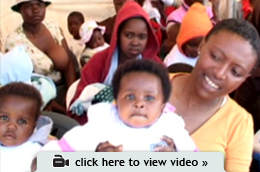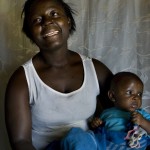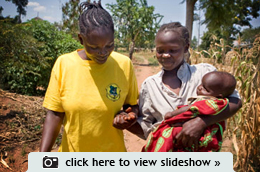New IYCN materials
New IYCN materials
Slideshow: Promoting better nutrition for children in Kenya’s communities
Video: Celebrating World Breastfeeding Week in Lesotho
Lesotho Infant and Young Child Feeding Curriculum
Fact sheet: IYCN’s approach to infant feeding and HIV activities
Helpful links and publications
UNICEF, WHO, WFP: Call for support for appropriate infant and young child feeding in Haiti
UNICEF, WHO, PAHO: Haiti Earthquake Technical Note on HIV and infant feeding
WHO’s new guidelines on HIV and infant feeding
UNICEF’s Tracking Progress on Child and Maternal Nutrition
New collection of national nutrition policies and guidelines on the IYCN website
Welcome to the fourth issue of the IYCN Update, a newsletter from USAID’s Infant & Young Child Nutrition (IYCN) Project. Distributed four times per year, each issue offers updates on the latest research, new resources, and project news.
Research highlights
Evidence supports coupling prevention with treatment of acute malnutrition
Following the Niger food crisis of 2004-2005, programs for community-based treatment of acute malnutrition found that the prevalence of acute malnutrition remained high. In an anthropological study published in the January 2009 issue of Disasters, researchers investigated social factors that may predispose children to acute malnutrition and contribute to its high prevalence. The authors found several harmful infant and young child feeding practices. They recommended that treatment-based nutrition programs should include integrated, long-term approaches to improve infant and young child feeding. Read more.
Can water safety interventions reduce diarrhea during weaning?
In a study published in the Journal of Infectious Diseases in September 2009, investigators implemented a set of household water safety interventions to determine whether preventing exposure to waterborne pathogens would reduce diarrhea during weaning among HIV-exposed infants. During the weaning period, the frequency of diarrhea was the same in both the intervention and non-intervention groups. The authors concluded that diarrhea during the weaning period may be attributable to factors other than waterborne pathogens. Read more.
Continued breastfeeding lowers the risk of serious gastroenteritis for HIV-exposed kids
The January 2010 issue of the Journal of Acquired Immune Deficiency Syndromes features several articles on gastroenteritis and early cessation of breastfeeding. One study analyzed the risk of serious gastroenteritis in HIV-exposed infants who participated in two different trials in the same hospital in Uganda during different time periods. In one trial, mothers stopped breastfeeding their babies before 6 months of age, while mothers in the other trial stopped after 6 months. Stopping before 6 months of age led to higher rates of serious gastroenteritis through 18 months, and higher cumulative mortality. Read more.
Country spotlight: Kenya
View our new photo slideshow featuring dedicated community volunteers who help HIV-positive mothers boost nutrition for their children in Kenya. Since April 2009, IYCN has collaborated with the Society for Women and AIDS in Kenya and PATH to train more than 400 volunteer counselors on improving infant feeding practices in Western Province. See how the volunteers are spreading the infant feeding message to mothers and families through home visits, support groups, and discussions at health centers. View the slideshow.
Project news
Haiti update
Our thoughts are with the victims and families affected by the Haiti earthquake. Over the past few weeks, we have been very concerned about the safety and well-being of our IYCN team in Haiti. We are relieved to report that we have been in contact with all three of our staff members, who are employed by IYCN’s partner CARE: Rose Mireille Exume, Jennifer LaTortue, and Natacha Pierre-Pierre. Our sympathies are with them as they cope with losses of family members and homes. IYCN Country Coordinator, Rose Mireille Exume, is helping coordinate emergency nutrition activities as a member of the Nutrition Cluster team led by the United Nations Children’s Fund (UNICEF). Check the IYCN website for future updates on the situation.
Please view and share the following important statements on appropriate infant and young child feeding during the Haiti emergency.
Introducing new programs in Bangladesh, Ethiopia, and Malawi
IYCN will expand its work to three new countries to reach mothers and children with nutrition interventions.
- In Bangladesh, IYCN is working with CARE to provide families with micronutrient powders to mix with their children’s food to combat anemia and motivate beneficial feeding practices. Learn more.
- In Ethiopia, the team is working with partners to provide training and support for improving nutrition practices for HIV-positive mothers and HIV-exposed children. Learn more.
- In Malawi, the project will support the Office of the President and Cabinet to build capacity for community-based nutrition and HIV services. Learn more.
Making a difference in Lesotho
 The project will wrap up activities in Lesotho this month. For the past two years, IYCN supported the Ministry of Health and Social Welfare to improve infant feeding practices by enhancing national policies, training more than 1,100 community-based workers to counsel mothers, improving linkages between health facilities and communities, and more. Program highlights include the recent launch of the national infant and young child feeding training curriculum for health workers.
The project will wrap up activities in Lesotho this month. For the past two years, IYCN supported the Ministry of Health and Social Welfare to improve infant feeding practices by enhancing national policies, training more than 1,100 community-based workers to counsel mothers, improving linkages between health facilities and communities, and more. Program highlights include the recent launch of the national infant and young child feeding training curriculum for health workers.
Read the stories of Mamorena and Tsepo to learn about the impact of IYCN’s efforts in Lesotho.
View a new video featuring Lesotho’s launch of demonstration gardens to improve complementary feeding, during World Breastfeeding Week in August 2009
Looking for the latest research on infant feeding and HIV?
Next month, the IYCN Project will launch a series of technical briefs to assist program implementers in understanding the evidence behind the new World Health Organization guidelines on HIV and infant feeding. Summaries of research on exclusive breastfeeding, formula feeding, and continued breastfeeding beyond six months will help nutrition and prevention of mother-to-child transmission of HIV program implementers and providers sort through the risks and benefits of promoting different feeding options to HIV-positive mothers. Look for the new materials soon.
Update from the field: South Africa
Training community volunteers
In October 2009, consultant Benny Sikhakhane helped IYCN start up a pilot project to integrate nutrition interventions into economic and educational development programs in South Africa’s Nigel District. Through a unique partnership with J&J Development Projects Trust, a private investment and management company, IYCN is introducing nutrition activities for mothers and children into community development plans. Read Benny’s message to learn about his experiences training community volunteers on infant feeding, reaching new mothers in the Nigel community, and educating community leaders on nutrition.
We welcome your feedback and suggestions for our next issue. Please contact: info@iycn.org.
Photos: Aurelio Ayala III, Evelyn Hockstein, Nkoate Thamae, Albertha Nyaku
Date: Feb 6, 2010 | Category: Newsletters


